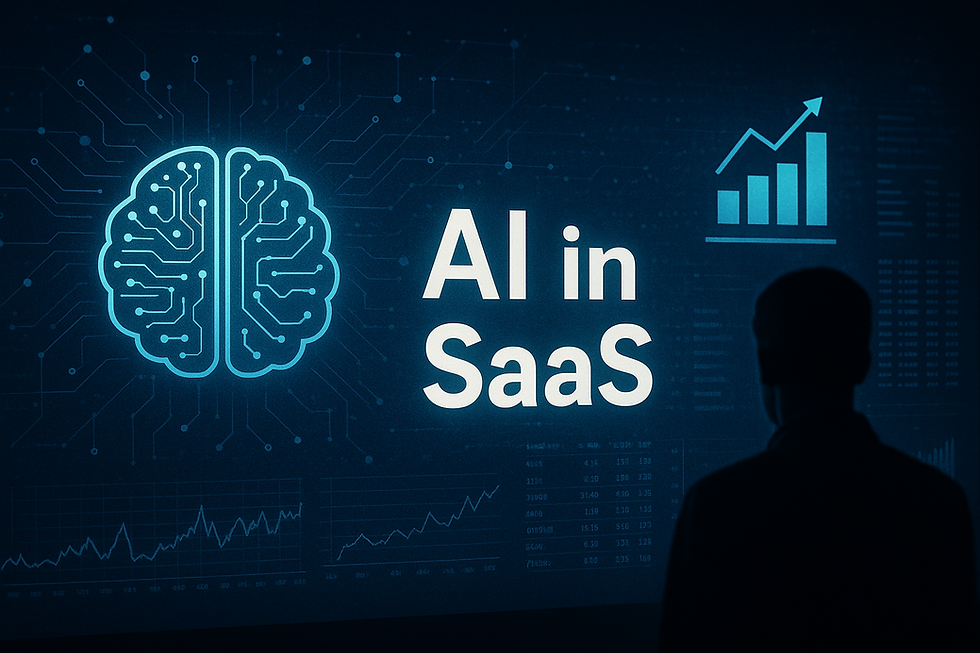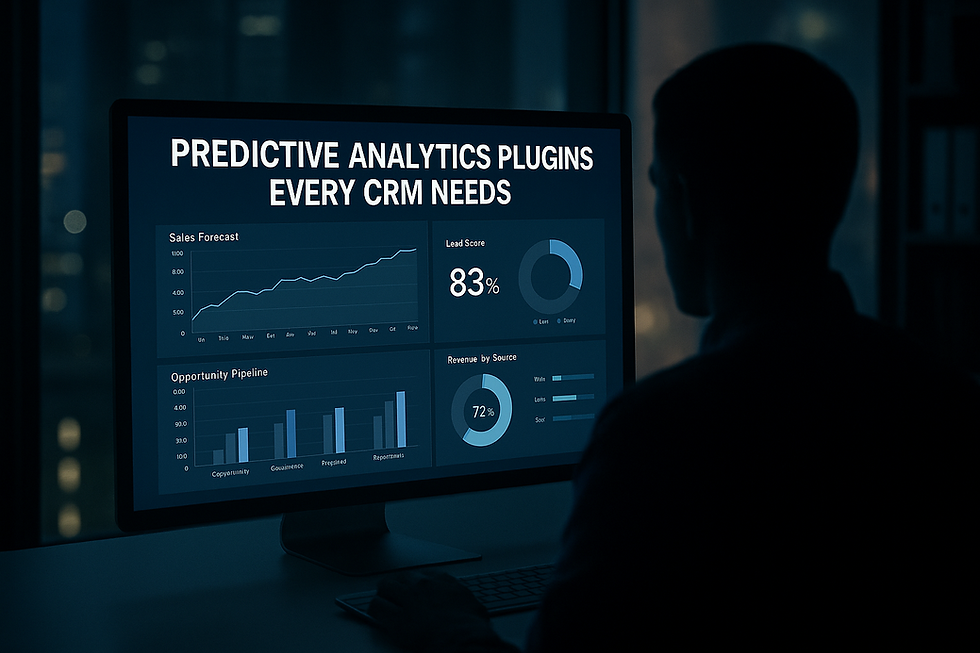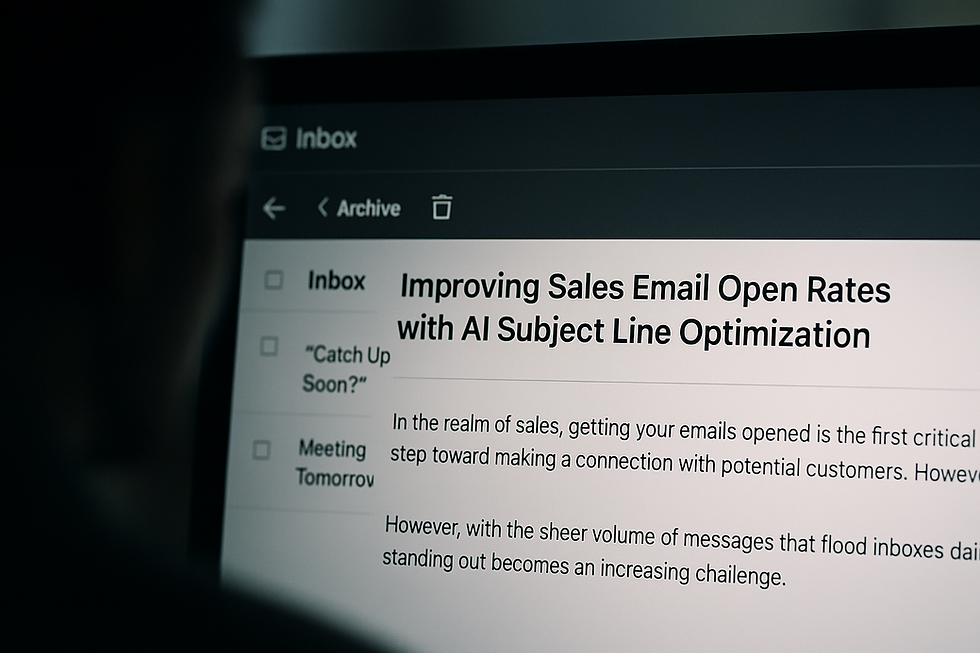AI in SaaS: The Hidden Engine Powering the Smartest Platforms in Business
- Muiz As-Siddeeqi

- Sep 17, 2025
- 5 min read

It’s not hype. It’s not speculation. It’s not a trend.
AI in SaaS is the seismic shift already underway — and it’s changing how billions in revenue are being made, saved, and scaled, every single day.
We’re not here to pitch you a futuristic dream. We’re not here to throw around buzzwords. We’re here to open the doors to what’s already happening behind the curtains of the world’s fastest-growing SaaS companies. This is about the documented shift in business, the undeniable impact on sales and customer lifecycles, the measurable improvements in retention, the massive cost-savings in operations, and the growing number of real-world cases that prove beyond any doubt:
AI is not the sidekick. In SaaS, it has already become the driver.
Bonus: Machine Learning in Sales: The Ultimate Guide to Transforming Revenue with Real-Time Intelligence
Bonus Plus: 10 Proven Micro SaaS Ideas That Are Making Money
From SaaS to Smart SaaS: This Isn't Just About Software Anymore
The term “Software as a Service” used to mean cloud-hosted software with recurring revenue models. But now, if a SaaS platform doesn’t have intelligence baked into it, it’s increasingly seen as outdated.
According to a 2024 report by Deloitte, over 76% of high-growth SaaS companies have embedded AI into at least one core process, and 51% have integrated AI across multiple functions including sales, customer support, and product optimization (Deloitte 2024 SaaS Transformation Report).
But what exactly is AI doing in SaaS right now — in the real world, in actual numbers, and in live platforms?
Real Sales Numbers, Real AI, Real Impact
Let’s get into it.
Salesforce Einstein, Salesforce's AI engine, is processing more than 200 billion predictions every day across its platform. According to Salesforce's 2024 Investor Briefing, clients using Einstein saw:
25% faster sales cycles
29% increase in opportunity win rates
31% higher lead conversion (Salesforce 2024 Annual Report).
Zendesk, in its 2024 Benchmark Report, documented that companies using AI-based ticket routing saw:
3.2x faster resolution times
27% lower customer churn
48% reduction in average handle time (Zendesk CX Trends 2024).
HubSpot, since integrating AI tools in its CRM, reported that users leveraging its AI-powered lead scoring closed more deals with 27% less effort and improved email campaign open rates by up to 42% (HubSpot Q2 2024 Release Notes).
The 6 Core Areas Where AI Is Disrupting SaaS Internally
We’ve seen how AI is being productized in SaaS tools. But what’s happening inside SaaS companies themselves is equally massive — and even more revealing:
1. AI-Powered Product Development
AI isn't just a feature in SaaS. It's a force in how the products themselves are built. According to GitHub’s 2023 Copilot Study, developers using AI code assistants shipped 55% faster, with less technical debt and fewer production bugs. Companies like Atlassian, GitLab, and Notion all reported substantial internal dev speed acceleration due to AI code generation and test case optimization.
2. Customer Success and Retention Optimization
No one wants churn. AI is the new guardian of customer retention. Totango, a Customer Success SaaS, uses ML-based health scoring models that factor 100+ metrics to proactively flag at-risk accounts. Their users reported churn reductions of up to 33% in early 2024 (Totango Customer Success Study 2024).
3. Pricing and Revenue Optimization
AI isn’t just helping SaaS companies set prices. It's helping them maximize profit. ProfitWell, now part of Paddle, provides AI-driven pricing insights and claims that optimized pricing strategies, based on machine learning, increased ARPU (average revenue per user) by 14–28% for its top 20% clients.
4. Marketing Automation and Predictive Campaigns
Marketers in SaaS are already living in the future. AI-powered platforms like ActiveCampaign, Marketo, and Ortto are using ML to analyze past engagement, suggest optimal send times, auto-generate subject lines, and even rewrite content. These tools led to:
Up to 300% higher click-through rates on AI-personalized campaigns
47% lift in MQL to SQL conversion according to Ortto’s 2024 Performance Analysis Report
5. Sales Funnel Intelligence
AI is embedded in sales analytics now. Platforms like Clari and Gong use AI to track deal progress, sentiment analysis in calls, and even probability scoring. In their 2024 case study, Gong reported that teams using its AI forecast guidance reduced forecast inaccuracy by 39%.
6. Customer Support Automation
This one’s not a trend. It’s table stakes now. AI chatbots powered by Ada, Intercom, and Tidio are handling millions of queries daily, with resolution accuracy reaching over 90% in many use cases.
Inside the Case: Real SaaS Companies Using AI at Scale
Let’s talk about cold, hard, verifiable examples — no hypotheticals, no faceless claims.
Intercom
Intercom’s AI chatbot, Fin, is now resolving over 50% of all customer queries without human intervention. According to their public data (Intercom AI Update 2024), this led to:
A 43% drop in support costs
A 23% increase in customer satisfaction
A measurable 10% increase in LTV (lifetime value)
Shopify
Shopify launched a suite of AI features under “Shopify Magic.” These include auto-generated product descriptions, AI email content suggestions, and smart inventory prediction. According to Shopify’s Q1 2024 Earnings Call, merchants using AI tools:
Had 20% faster listing times
Saw a 19% higher conversion rate
Reduced cart abandonment by 17%
Grammarly
Grammarly’s SaaS AI product is now built on transformer models fine-tuned with real-time behavior. In 2023 alone, Grammarly Business users saw a 22% increase in clarity scores in internal communications, and 32% faster content turnaround, according to its Annual Impact Report.
The Surge in AI-SaaS Acquisitions and Venture Capital
The money is speaking loud and clear.
In 2023–2024, over $4.2 billion in venture funding flowed into AI-first SaaS startups, according to CB Insights.
AI-in-SaaS acquisitions are up +118% YoY, with giants like Adobe acquiring Rephrase.ai, Zendesk acquiring Ultimate.ai, and Atlassian acquiring Percept.AI.
SaaS companies that highlighted AI capabilities in investor presentations saw 28% higher funding rounds, on average, according to Crunchbase Pro’s July 2024 VC Report.
AI in SaaS Is Not Optional Anymore. It’s a Revenue Multiplier.
There was a time when AI was a buzzword. Not anymore.
Today, AI is the difference between a SaaS company that scales and one that stalls.
It’s what gives startups the ability to punch above their weight. It’s what lets small teams achieve enterprise-grade personalization. It’s what turns static data into active decision-making. It’s what ensures that SaaS products never stop learning, never stop improving, and never stop selling.
SaaS without AI is becoming the new floppy disk.
The Bottom Line: Where Is This All Going?
Let’s keep it 100% real. AI in SaaS is not just about automation. It’s about augmentation. About giving SaaS products the ability to think, react, improve, and adapt in real time — based on real data from real users.
The future?
SaaS platforms that adapt pricing models in real time based on usage behavior.
CRMs that predict churn 90 days in advance — and auto-deploy retention workflows.
BI dashboards that build themselves with zero-code natural language.
Support teams that never sleep and never scale linearly with human costs.
And it’s already here. In fact, it’s been here for a while. And if your SaaS product isn’t embracing AI now, someone else’s is — and their churn rate just dropped 25%.

$50
Product Title
Product Details goes here with the simple product description and more information can be seen by clicking the see more button. Product Details goes here with the simple product description and more information can be seen by clicking the see more button

$50
Product Title
Product Details goes here with the simple product description and more information can be seen by clicking the see more button. Product Details goes here with the simple product description and more information can be seen by clicking the see more button.

$50
Product Title
Product Details goes here with the simple product description and more information can be seen by clicking the see more button. Product Details goes here with the simple product description and more information can be seen by clicking the see more button.






Comments